Best acoustic guitar strings: our top-rated strings for your acoustic
We pick the best guitar strings for acoustic guitar from Ernie Ball, D'Addario, Martin, and more
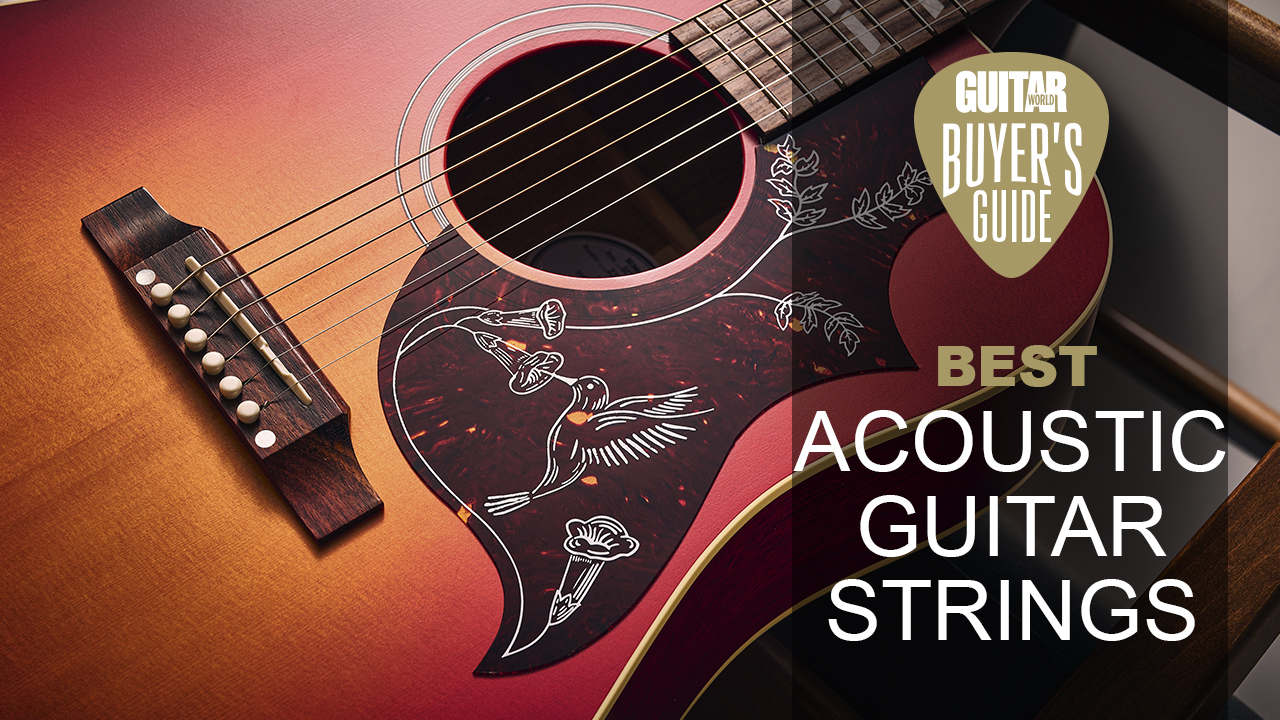
Changing your strings is part and parcel of being a guitarist, but it doesn't have to be such a dull and regimented process. If you haven't tried out a fresh gauge or a different brand, you might be surprised at how big a difference a set of the best acoustic guitar strings can actually make to your playing.
Strings aren't particularly expensive, which means you can experiment with different types, and I strongly recommend you try out a few different gauges, even if you've been playing a while. A different set of strings can completely change the way your acoustic plays, opening up fresh playing styles and approaches that can bring a new lease of life. For more info on how important gauge is, check out the dedicated string gauge section of this guide for more info.
In my opinion, the best set of acoustic guitar strings overall has to be the Ernie Ball Aluminium Bronze Acoustic, which delivers a bright tone and long life for a non-coated set. If you're just after something cheap and cheerful, the D'Addario 80/20 Bronze sets are superb value for money, and great if you want to experiment with your string gauge and tension.
Making the decision can be a tough one, especially when you consider the sheer amount of string sets that are available nowadays. So to make things a little easier for you, we've picked out our favorite sets and sorted them by use case. We've also included an in-depth FAQs section which answers loads of common questions you might have about acoustic guitar strings, and a glossary of key terms in case you're unsure about any of the technical words used in this article.
Product guide
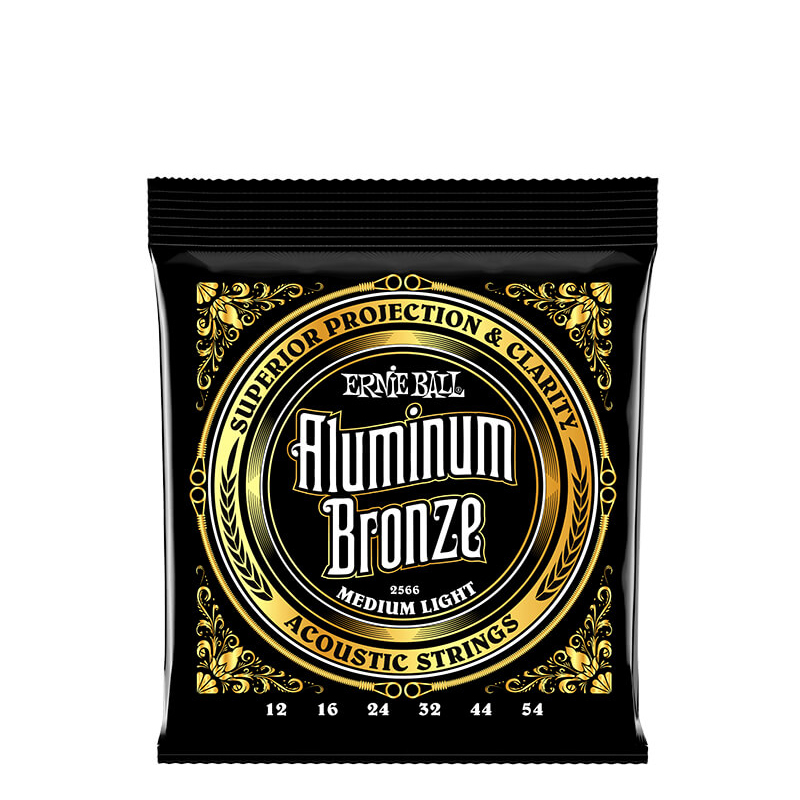
Material: Steel core, aluminum bronze winding
Coated: No
+ Premium protection
+ For all players
- Can be too bright
Strings take quite a beating over the course of their lifespans. Whether it’s changes in temperature and humidity or simply being constantly tickled by your sweaty fingers, the life of a string is a tough one. So, if you are looking to prolong the life of your strings, the Ernie Ball Aluminum Bronze set is a solid choice - especially if you aren't a fan of traditionally coated strings.
Now, while we personally like the sound of a brighter acoustic guitar, we will admit that these Ernie Ball strings are particularly bright. So, you should bear that in mind if you own an acoustic guitar that's already voiced with brighter-sounding tonewoods.
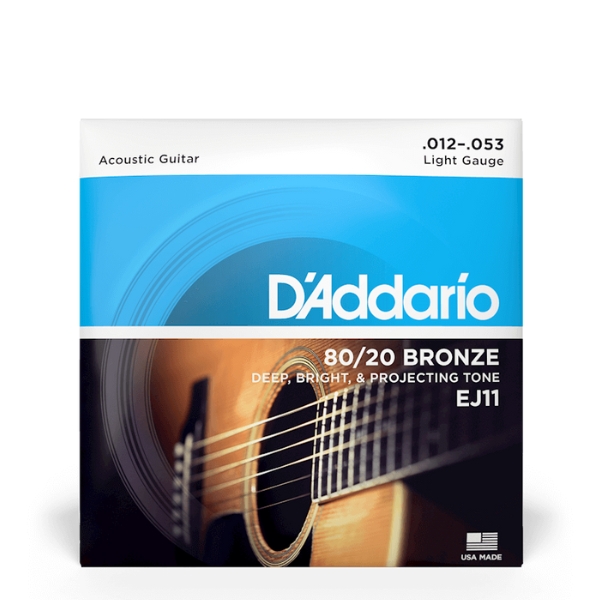
Material: 80/20 Bronze
Coated: No
+ Excellent value
+ Great for beginners
- Not as durable as others
Strings are relatively inexpensive when it comes to it, but if you need a cheaper set that doesn't compromise on quality, we'd go for the D'Addario EJ11 80/20 Bronze. Available for around the $5-6 mark at pretty much every retailer, these are great value strings for those on a budget or for those looking for a reliable set for your beginner acoustic guitar.
We've gone for the light gauge as our top pick but there's a total of six different gauges available from this range including an extra light set as well as a hybrid offering with a light top, medium bottom. They're bright and bold sounding, but won't last as long as a coated set.
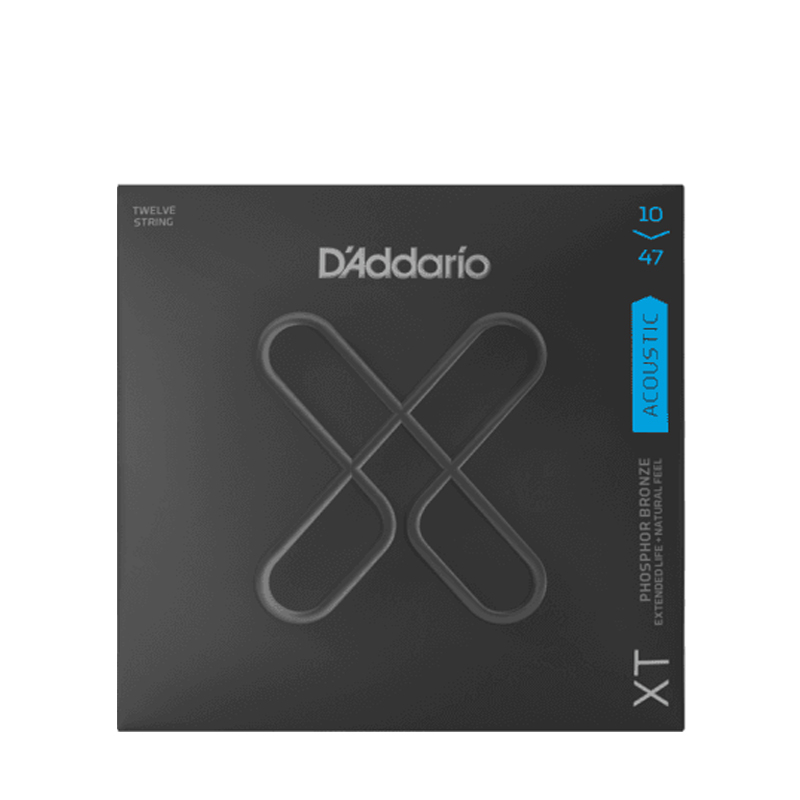
Material: Phosphor bronze, 80/20 bronze
Coated: Yes
+ Effective coating
+ Great tuning stability
- Coating isn't for everyone
The new XT line-up may be D'Addario's most advanced strings yet. These meticulously designed strings combine all of D'Addario's bright ideas - including high-carbon NY Steel, fusion twist technology and, of course, those irresistible colored ball ends - and adds a new string coating that not only triples the lifespan of the string but to us, they feel nearly identical to uncoated strings.
Look, this advanced technology doesn't come cheap. These fancy strings are significantly more expensive than a standard set, and to some ears, there may not be that much of a difference in tone.
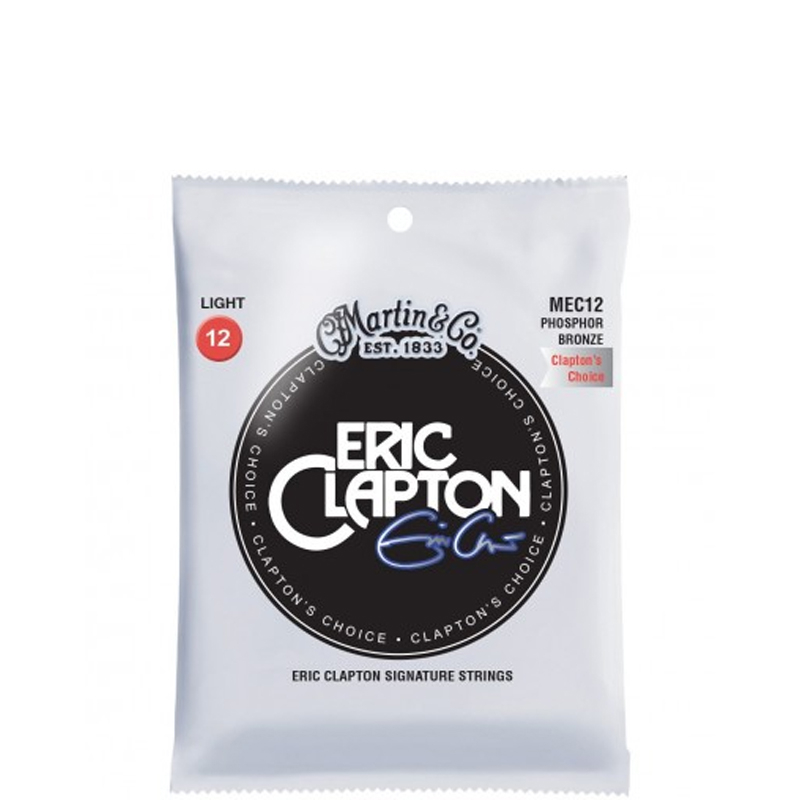
Material: Phosphor bronze, steel core
Coated: No
+ Consistent
+ Durable
- Too mellow
If you're a fingerpicker then you'll want a set of strings that's a little less bright. These Martin 'Clapton's Choice' Strings are much less zingy than the other sets here, making them great for those who are down to pluck.
The overall warm tone of these strings makes them perfect for those gentle fingerstyle pieces, helping deal with the 'clank' you sometimes get when fingerpicking with regular acoustic strings. Of course, if you're looking for a modern, bright attack from your acoustic, you will want to look elsewhere.
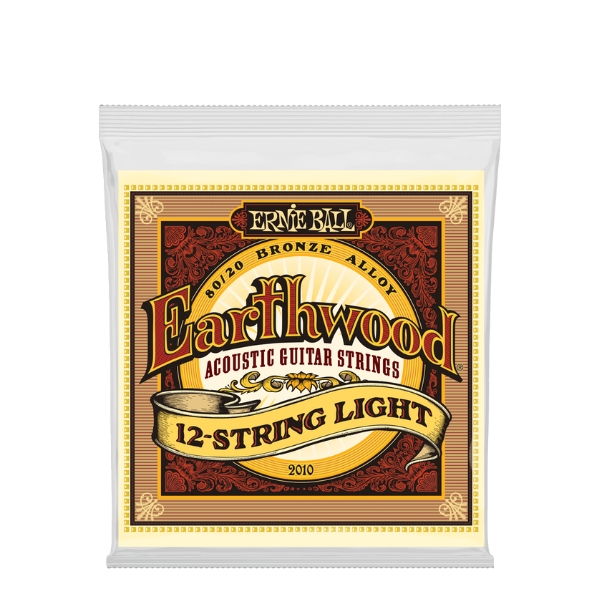
Material: 80/20 bronze
Coated: No
+ Great value
+ Bright sound
- Coated would last longer
Restringing a 12-string guitar is not for the faint of heart, but we've found the Ernie Ball Earthwood 12-string set to last particularly long for an uncoated set. They're also considerably cheaper than a coated set of strings, making them perfect for those who want a good value set for their 12-string.
As with most Ernie Ball acoustic string sets these are quite bright sounding, which can definitely add to the sparkly sound of a 12-string. They're nicely balanced across the frequency spectrum, and come in a heavier gauge set if you like more resistance or want to downtune.
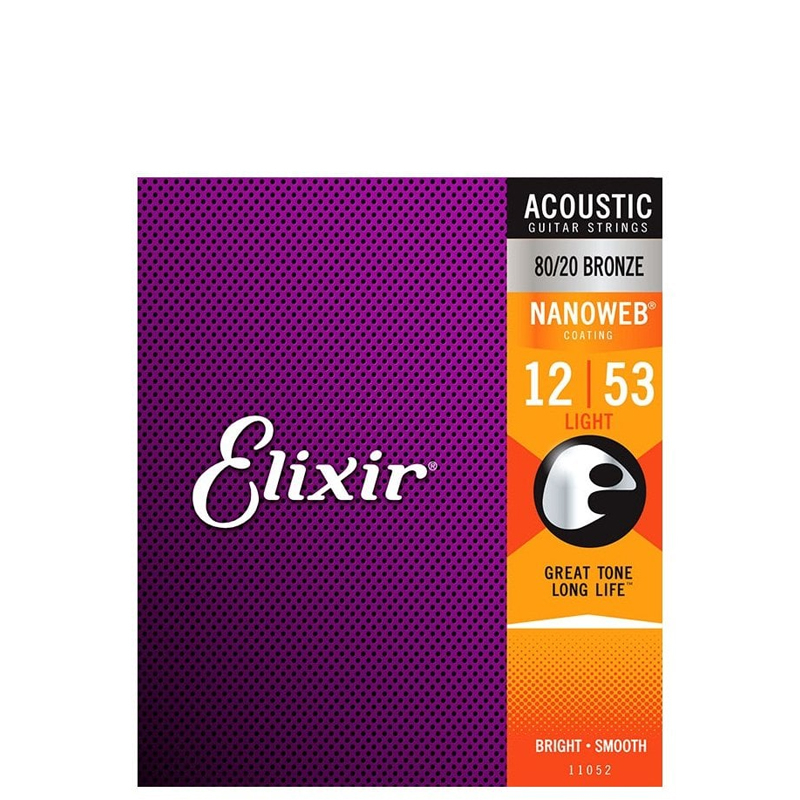
Material: Steel core, 80/20 bronze winding
Coated: Yes
+ Coated without affecting tone
+ Highly playable
- Too bright for some
Elixir knows a thing or two about coating strings and has developed a patented coating which the company claims offers the same protection as regular polymer coatings but without the tonal drawbacks - making them arguably the most well-known maker of coated strings.
In our experience, these strings last longer than uncoated strings, yet at no point will make you feel like you're compromising tone in order to achieve this durability. That said, the coating can break down if you're a heavy hitter. So, bear that in mind if you like to smack those cowboy chords.
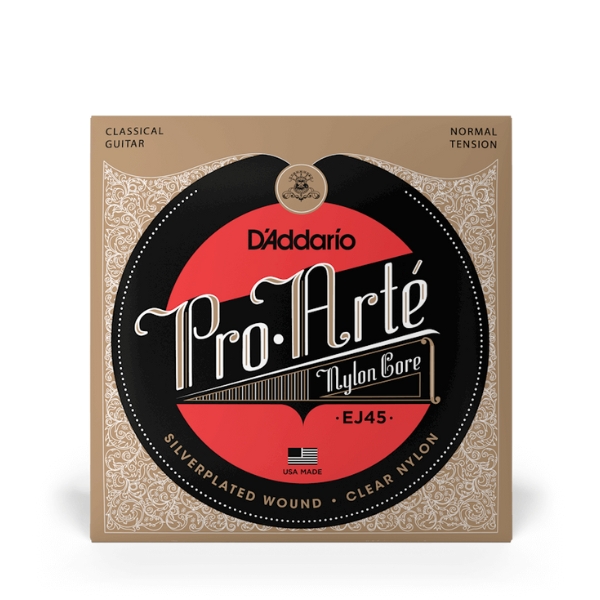
Material: Nylon, silver-plated copper winding
Coated: No
+ USA made
+ Articulate tone
- Some may prefer ball ends
Although nylon strings deteriorate at a slower pace compared to steel strings due to their resistance to oxidation, it’s still beneficial to keep them fresh. Unsurprisingly, D’Addario produces some of the best nylon strings in the business, particularly the Pro Arté series.
The Pro Arté series offers two tensions—normal and hard—with the latter being preferable for a snappier, louder tone that has plenty of high-end zing. The normal tension has a mellow tone that works very well for softer classical pieces. However, if you find the process of tying nylon strings to the bridge fiddly and prefer ball-end strings, they might not be your first choice.
How to choose
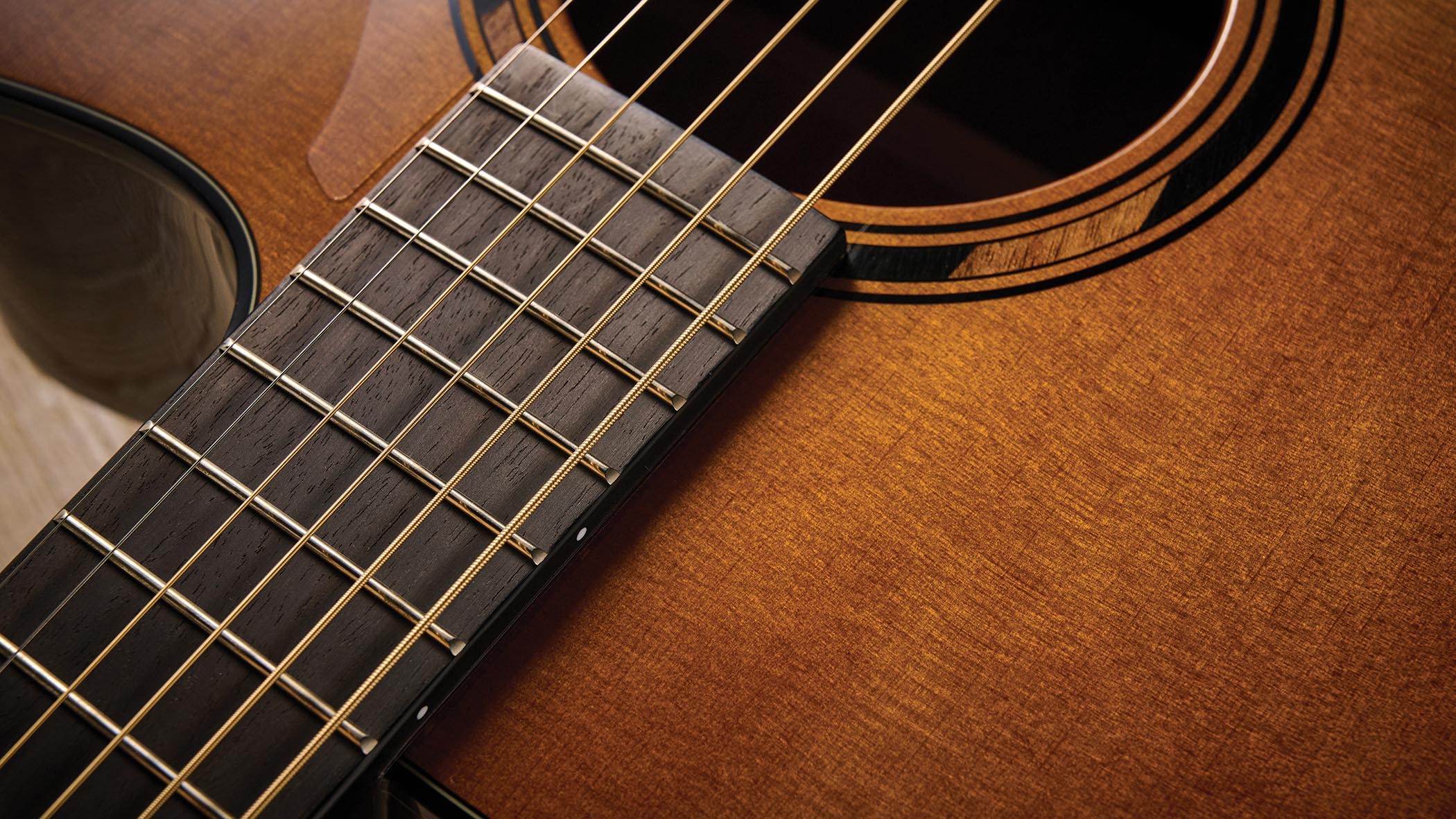
Choosing the right set of strings for your acoustic guitar requires you take into account a combination of factors. From the instrument you to play to your preferred genre, and even your picking style, here's what you should be looking at before committing to buying a particular set of strings.
1. What gauge?
You can trust Guitar World
We've got a section discussing string gauges in-depth further down this guide, but this is probably the key factor in your decision. Differences between brands are pretty small, but differences in gauge can be absolutely massive. If you're not sure which gauge you prefer, then keep scrolling down the page for more info.
2. Which material?
There are a few different materials commonly found in guitar strings. Here's a breakdown of the most popular ones:
- Bronze: Delivers a bright, and crisp tonality. Great for a variety of playing styles.
- Phosphor bronze: Adds some warmth to the sound of bronze strings, and is pretty versatile across picking styles.
- Silk & steel: Deliver a mellow and subdued tone, great for recording and fingerpicking.
- 80/20 bronze: Sounds bright, sharp, and articulate. Sounds great with hard strumming.
- Coated: Can be any of the above materials but coated with a polymer to make it last longer. This results in a slightly more smooth and subdued sound.
3. Alternate tunings?
If you like to play in alternate tunings it's definitely worth experimenting with different sets to get the right string tension across all the strings. This could mean mixing and matching, or getting a custom set of strings put together.
Key terms
- Action: The height in between the strings and the fretboard.
- Alternate tuning: A tuning that isn't EADGBE, often used for more creative playing and slide guitar.
- Ball end: The small circular part at the end of the string which keeps it hooked into the bridge or guitar body.
- Bronze: A common type of material used in manufacturing guitar strings.
- Coated strings: A type of string that features a polymer coating to enhance the lifespan, but affects the sound.
- Fingerstyle: When you pluck the string of the guitar with your fingers rather than a pick.
- Frets: The small metal strips that run along the fretboard of the guitar.
- Gauge: The thickness of any guitar string. Can be referred to as light for thin strings and heavy for thicker ones.
- Intonation: How in tune the guitar is across the length of the fretboard.
- Nut: The small part at the top of the fretboard that guides the strings through to the tuners.
- Phosphor bronze: Another material frequently used when manufacturing guitar strings.
- Plain strings: Refers to the thinner strings that don't have any metal wound onto them.
- Saddle: Part of the acoustic guitar bridge that the strings rest on as they head up to the fretboard.
- Tension: Used to describe how hard a string is to move around.
- Wound strings: Refers to the thicker strings of a guitar, usually the lowest three that feature a steel core with a different material wound around it.
String gauges explained
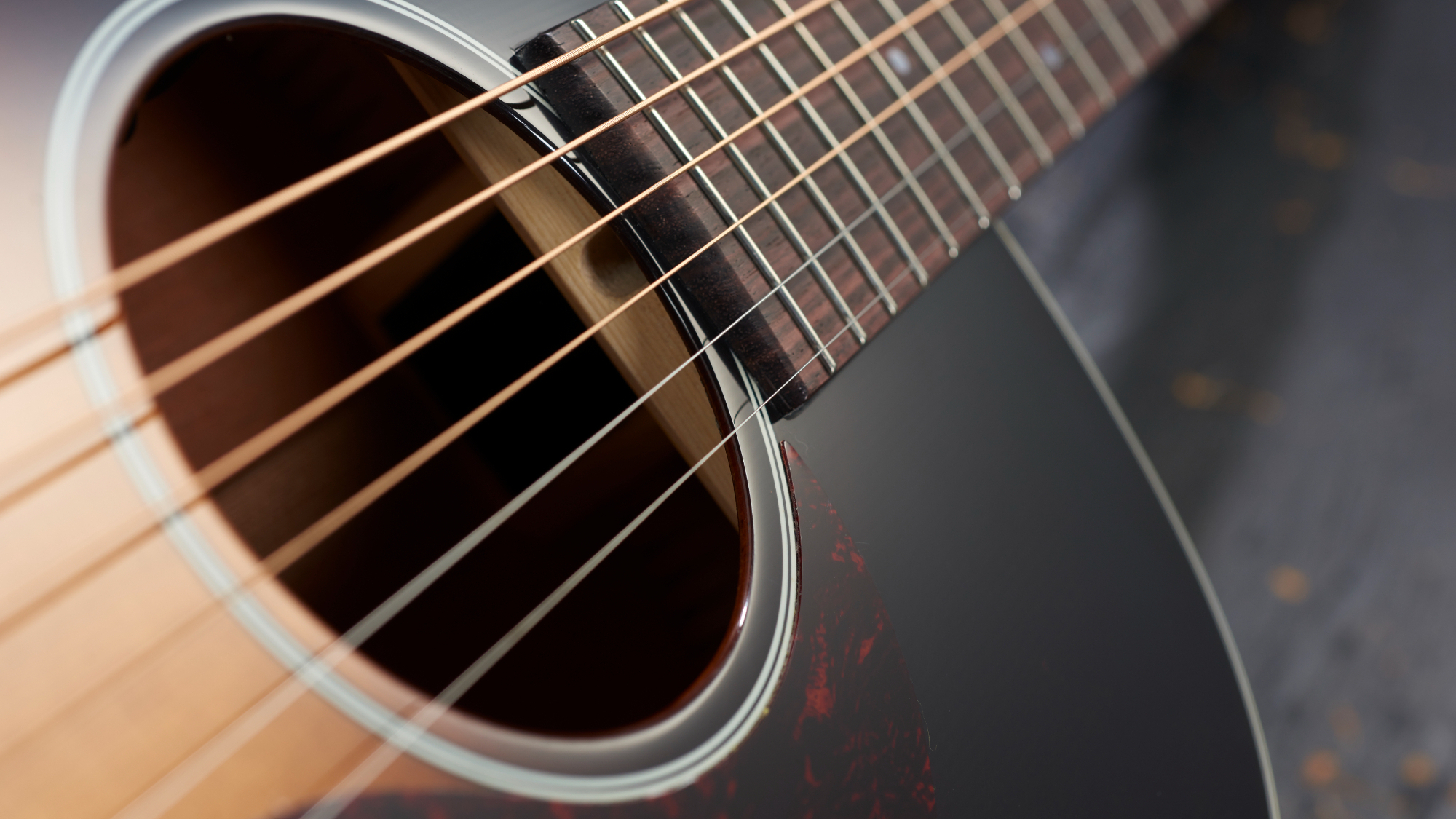
A key factor when looking at guitar strings is the gauge – that is, how thick they are. Gauge is measured in thousandths of an inch, which sounds tiny, but small differences in gauge can have a big impact on how they feel under the fingers.
Thicker gauge strings means there is physically more string there to push down on, so if you’re a beginner then generally you’d be looking at lighter or more medium gauges (although there really are no hard and fast rules). Some players claim that thicker strings lead to a better tone, and there is some evidence to back that up, but honestly, you’re going to get a better sound if you’re comfortable with what you’re playing.
Heavier gauge strings are also great if you tune down, as they will hold their tuning a little better. If you know that you have quite a heavy strumming hand, then heavier strings can help with this too as you’re going to be less likely to snap a string when playing.
A lighter gauge means you will have slightly thinner strings. This can make it a little easier for some players, and some fingerpickers with a softer touch will get a better dynamic response from lighter strings as they’re able to control them more.
With gauges, it really is a case of trying a few out and seeing what works for you. If you’re not sure, go for something in the middle – you can’t go far wrong with a set of regular or medium gauge acoustic strings, regardless of what style you play.
FAQs
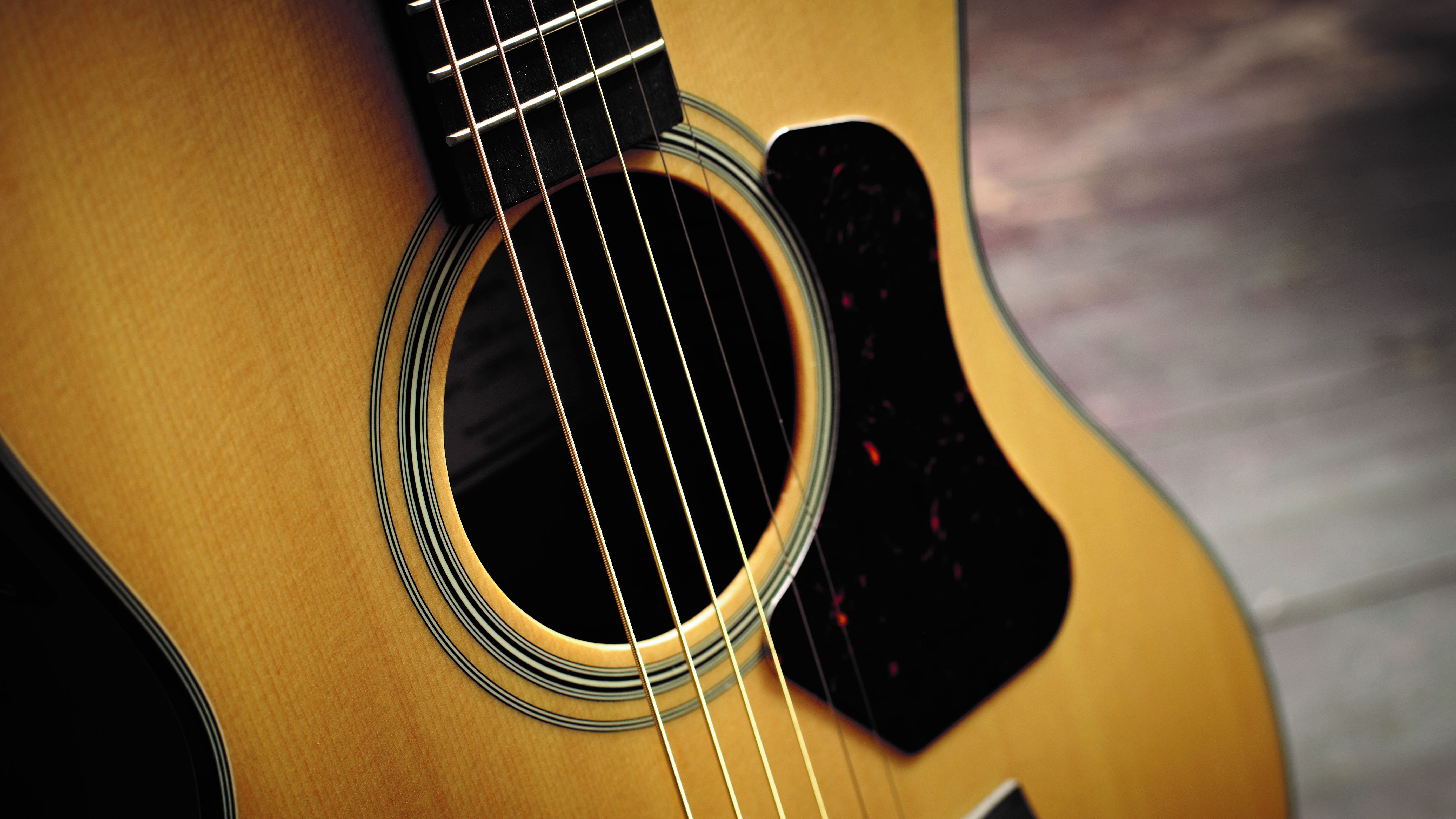
What are the best acoustic guitar strings you can buy today?
We have to mention the Ernie Ball Aluminium Bronze strings - they’re really good ‘all-rounder’ strings that work well for both fingerpicking and strumming. They project nicely, and they sound clear and balanced - definitely one of the best acoustic guitar strings on the market.
Elixir also make some incredible coated strings that help preserve that bright, freshly-restrung sound for up to 3-5 times longer than uncoated strings - they’re also what Taylor use on all of their steel-strung acoustics. Acoustic experts Martin also make a range of strings to suit quite literally any style of player.
What are acoustic guitar strings made of?
Acoustic guitar strings are essentially a metal core - usually stainless steel, with the thickest four strings wrapped in thinner metal windings. The exact materials can vary, but usually they’re made from bronze or copper. This differs from electric guitar strings which are usually wound with steel, or nickel so that they work better with the magnetic field created by the pickups.
It’s worth noting here that you don’t want to fit steel acoustic strings to a classical guitar either - doing so could end up causing damage to it.
What types of acoustic guitar string are there?
Acoustic guitar strings differ greatly when compared to electric guitar strings, and are manufactured differently. The main two types of acoustic string you’ll see are 80/20 bronze, and phosphor bronze. 80/20 bronze, or brass, is an alloy made from 80% copper and 20% zinc. Phosphor bronze is simply bronze, with phosphor added to the alloy. Whilst this all might sound a little boring, the two types of string do actually make quite a difference to the sound of your acoustic guitar.
Generally, 80/20 bronze strings tend to be brighter, with a more pronounced top end. Phosphor bronze on the other hand are often mellower, and slightly warmer sounding. Considering what sort of tone you’d like can be a good starting point when looking for the best acoustic guitar strings.
What are the benefits of coated acoustic guitar strings?
Coated strings have become more and more popular over the last decade or so. Some of the best acoustic guitar strings have a coating around the string that helps prevent dirt and sweat from getting into the grooves, making them sound like new strings for longer.
Coated strings are usually more expensive, but you won’t have to replace them as regularly, because they retain that fresh, bright sound for a longer period. Some coated strings have a slightly different feel, but if you’ve never tried them before then they’re worth investigating.
Which is better, Phosphor or 80/20 Bronze?
Usually you’ll find that the thickest four acoustic guitar strings consist of a stainless steel core, with windings wrapped around; the thinnest two are plain. Generally speaking the windings are made from either phosphor bronze or 80/20 bronze; both of which have particular tonal characteristics that make them less or more appealing to different players.
Phosphor bronze acoustic strings tend to be a little warmer and mellower, with a balanced response, whereas 80/20 bronze strings sound brighter, with some nice detail. They also tend to have a good bass response, with almost a slight natural mid scoop.
How often should I restring my acoustic guitar?
How regularly you need to change the strings on your acoustic guitar will also vary. If you’re playing it a lot, then once every 6-8 weeks or so will keep your instrument in good shape (you can wait a little longer if you’re using coated strings). If you’re playing it more, or playing it live, then maybe more regularly, and vice versa.
Why trust us?
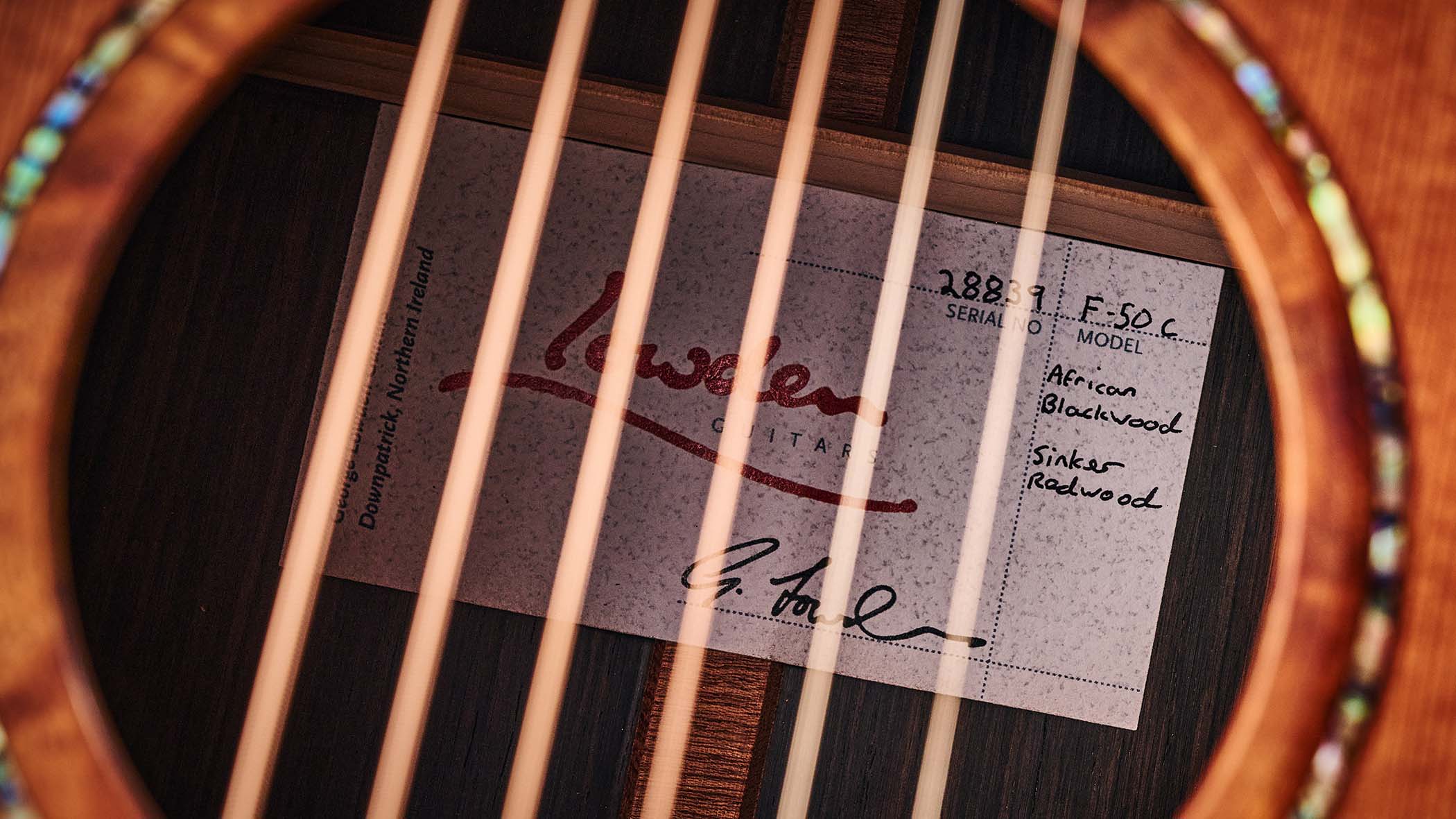
☑️ A global audience of 3.8 million monthly
☑️ 1,200+ reviews on GuitarWorld.com
☑️ 30+ years of product testing at Guitar World
Guitar World boasts over 44 years of expertise and stands as the ultimate authority on all things related to guitars. The magazine and website feature expertly written gear round-ups and top-quality, authoritative reviews penned by a team of highly experienced industry professionals.
Guitar World's inaugural print issue hit the shelves in July 1980, and ever since, it has been captivating players and enthusiasts with engaging lessons, insightful interviews with the biggest guitar heroes, and priceless buying advice for newbie players.
Furthermore, GuitarWorld.com continues this legacy online and serves as the hub of the world's foremost authorities on guitar playing. The site not only hosts content from Guitar World but also showcases articles from respected publications such as Guitarist, Total Guitar, Guitar Techniques, and Bass Player. With a reach extending to 3.8 million players each month, GuitarWorld.com is a go-to destination for guitar fanatics globally.
Below, you'll find more information about the expert authors and reviewers who helped put this page together.
Meet the experts

Matt is a Junior Deals Writer here at Guitar World. He regularly tests and reviews music gear with a focus on guitars, amps, pedals, modelers, and pretty much anything else guitar-related. Responsible for over 60 buying guides, a large part of his role is helping guitarists find the best deals on gear. Matt worked in music retail for 5 years at Dawsons Music and Northwest Guitars and has written for various music sites including MusicRadar, Guitar Player, Guitar.com, Ultimate Guitar, and Thomann’s t.blog.

Chris Corfield is a journalist with over 12 years of experience writing for some of the music world's biggest brands including Orange Amplification, MusicRadar, Guitar World, Total Guitar and Dawsons Music. Chris loves getting nerdy about everything from guitar gear and synths, to microphones and music production hardware.

After spending a decade in music retail, I’m now a freelance writer for Guitar World, MusicRadar, Guitar Player and Reverb, specialising in electric and acoustic guitars, bass, and almost anything else you can make a tune with. When my head’s not buried in the best of modern and vintage gear, I run a small company helping musicians with songwriting, production and performance, and I play bass in an alt-rock band.

Ross has been a music lover and guitar player since the age of 8. He has spent the five years since graduating from university working in music retail, selling guitars, amps and more. Ross is particularly interested in electric guitars, pedals and amplifiers and his current rig includes a trusty 2009 American Standard Stratocaster and Vox AC30S1 with a few Walrus Audio and Way Huge pedals in between.
How we test
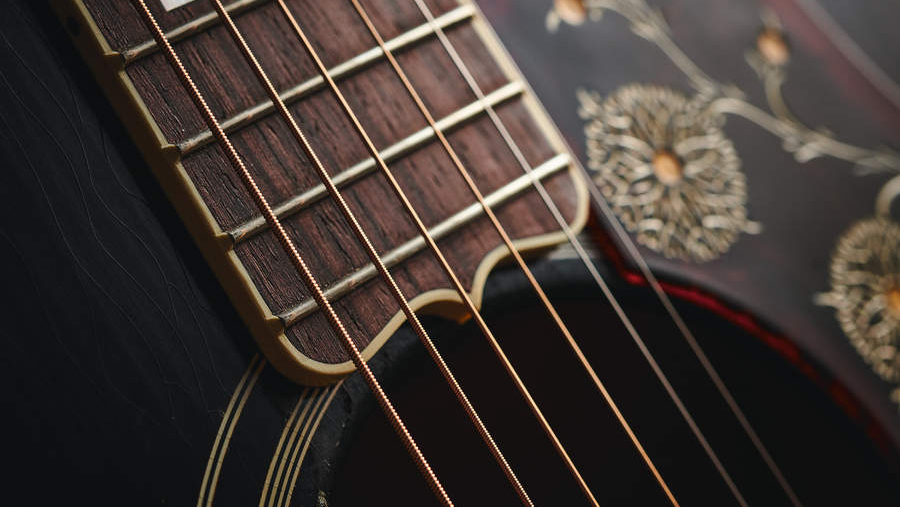
When it comes to testing acoustic guitar strings, it's essential that we put them through their paces to ensure they are fit for your beloved guitar. Now, that means putting them through a bunch of everyday tests.
We'll start by stringing the guitar with a fresh set of strings and observing how long they take to "bed-in". In this test, we are looking to see how long the strings take to become stable in their tuning. Of course, we are looking for this to be as quick as possible, with the best acoustic guitar strings taking minutes rather than hours.
Next, we need to test how the strings feel under our fingers. Naturally, we are looking for smooth strings, that allow us to glide effortlessly up and down the fretboard. When it comes to coated strings, we prefer not to notice the coating while we play - we'd rather just notice the anti-corrosion qualities. Speaking of corrosion, that brings us on to the longevity of the strings. To test this, we'll keep the strings on our guitar for as long as possible and take note of when they start to discolor, tarnish and lose their spark.
Now, obviously, how a set of strings sounds is very important. To test the tone of the strings, we make sure to play a wide variety of styles to see how the strings handle the different musical genres. We'll pay close attention to how the EQ of our guitar has changed with the addition of the new strings.
Read more about our rating system, how we choose the gear we feature, and exactly how we test each product.
Related buyer's guides
- Stock up on guitar gear essentials and accessories
- Best acoustic guitars under $500: including acoustic electric guitars
- Best acoustic guitars under $1,000: great tone for less
- Freshen up with the best bass strings
- Check out the best acoustic guitar pickups
- Just starting out? Check out the best beginner classical guitars
All the latest guitar news, interviews, lessons, reviews, deals and more, direct to your inbox!
Chris Corfield is a journalist with over 12 years of experience writing for some of the music world's biggest brands including Orange Amplification, MusicRadar, Guitar World, Total Guitar and Dawsons Music. Chris loves getting nerdy about everything from guitar gear and synths, to microphones and music production hardware.
- Ross Holder
- Richard Blenkinsop
- Matt McCrackenJunior Deals Writer
